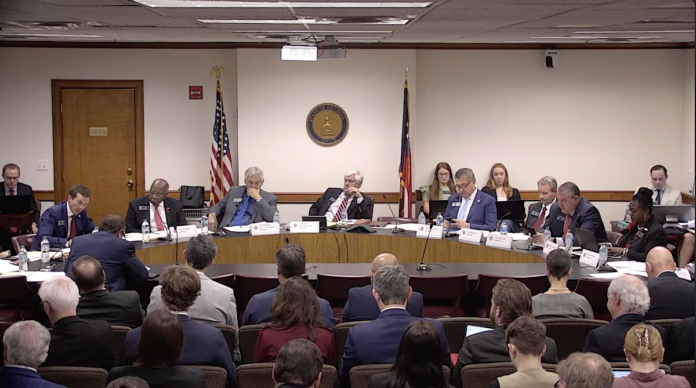
(Georgia Recorder) — Georgia Power, a national data center association, and clean energy groups are divided over the need for legislation that would prevent state-regulated utilities from raising electricity rates to cover the costs of energy-guzzling data centers.
Sen. Chuck Hufstetler, a Rome Republican, said he filed Senate Bill 34 to protect residential and commercial ratepayers from getting hit with higher utility bills because of large-scale utility company investments to meet the energy demands of artificial intelligence.
Projected energy demands
The Senate Committee on Regulated Industries and Utilities held a hearing last week on a measure that prohibits the Georgia Public Service Commission from changing any utility rates because of costs incurred providing electric services to commercial data centers.
Georgia Power executives have said that 80% of its projected increased energy demands over the next decade is tied to prospective data centers opening in the state. The company is projecting electrical load growth will increase by 8,200 megawatts by 2030, representing an increase of 2,200 megawatts compared to its forecast in the 2023 Integrated Resource Plan update.

Representatives with Georgia Power and the Data Center Coalition said they oppose the way SB 34 gives the state Legislature control over a ratemaking process that is typically handled by the five-member PSC. Supporters of the measure give credit to the PSC for passing a new rule in January creating new protections for Georgia Power ratepayers against the influx of energy-hungry data centers, but push for more safeguards from the state.
Hufstetler said his bill provides more ironclad protections than the PSC rule.
“The two things I hear most from everybody right now are property taxes and electricity bills,” he said. “I know the PSC would like to keep the Legislature out of this, but I think this is just too huge of an issue for us not to make sure we’re taking care of the citizens.”
‘A new frontier’
Following Thursday’s 90-minute Senate hearing, Sen. Bill Cowsert, an Athens Republican who chairs the committee, said further debate about the proposal is needed before a decision is made on whether it will advance in the Legislature.
“We’re really going into a new frontier,” he said. “You’ve had two mega data centers so far, you’ve got 10 more already on the books, and it’s the wild, wild west going on as they’re exploding in growth.”
The new data center rule authorizes Georgia Power to enact contractual agreements with companies that will use 100 megawatts of power. It allows the utility company to “appropriately assign” to data centers the costs of providing them with electric service.
The rule also gives Georgia Power the ability to require data center companies to put up front-end collateral for energy costs over the lifetime of the contract. If the company abandons the project prior to the contract expiring, then Georgia Power would keep the remaining money owed.
The PSC must review new agreements with large-load customers within 30 days of being signed.
The commission will vote in July on the investor-owned utility’s 2025 long-term roadmap of providing a mix of energy and infrastructure to serve 2.7 million customers and Georgia’s growing industrial base.
Georgia Power is expected to file a new rate case with the PSC in 2025 asking to recover costs to serve its customers over the next three years.
Six rate hikes in two years
Environmental and consumer advocacy groups have raised alarms about Georgia Power’s long-term plan that would significantly expand its reliance on fossil fuels like coal, gas, and oil. They also express concerns about how potentially higher fuel costs and other expenses will further burden the typical Georgia Power household and small business owner.
Since 2023, the average Georgia Power residential customers is paying $43 more per month following a series of increase to base electric rates, to recover excess fuel expenses, and complete two of the newest nuclear power generators at Plant Vogtle.

Bob Sherrier, staff attorney for the Southern Environmental Law Center, said Thursday that one large data center can consume over 1,000 megawatts and the potential demand from the industry could potentially double the state’s current energy demand.
He said the new PSC rule gives regulators more control over how Georgia Power recoups money spent on data centers. However, questions remain if it does enough to protect other customers.
Sherrier said it’s going to be extremely expensive to bring the large data centers onto the power grid, with major investments in transmission and distribution lines and power plants, as well as increased energy fuel expenses.
“Did residents cause Georgia Power to file an emergency IRP a year ago that asked to spend billions of dollars to build new power plants?” Sherrier said. “They didn’t. Is it because of small businesses that they require miles and miles of new, expensive transmission lines? No, I think that this bill sets an appropriate standard for making sure that they don’t have to pay for those costs.”
Opposition to SB 34
Aaron Mitchell, vice president of pricing and planning for Georgia Power, said that the proposal is unnecessary since the PSC rule requires data centers to bear the full cost of their energy consumption.
Several dozen companies have expressed interest in building data centers inside the Peach State.
According to the U.S. Department of Energy, data centers consume 10 to 50 times as much electricity as the average commercial building.
A forthcoming report commissioned by the Data Center Coalition, a national membership association for industry, found that direct employment in the data center industry increased 7% from 2022-2023, going from 28,120 jobs to in 2022 to to 30,070 the following year, according to Khara Boender, senior manager of state policy for the coalition.
“We would like to stress that the data center industry is committed to paying for its full cost of service for electricity,” Boender said. “We do not want residential ratepayers subsidizing data center energy use.”
Boender said the Data Center Coalition opposes the bill.
“Since the PSC has taken action to ensure large load customers bear the cost of their energy use, we encourage the committee to resist advancing legislation that would duplicate those efforts being addressed in the regulatory environment where the rate setting has traditionally taken place,” she said.
Atlanta among fastest metro areas for data center construction
A report in December from real-estate firm CBRE found that Atlanta is among the fastest growing metropolitan areas in the nation for the construction of data centers. The amount of data center power capacity jumped by 74% during the first half of 2024 compared to the first half of 2023.

Major companies like Meta, Microsoft, Google and X have either opened data centers or announced plans to open facilities in Atlanta. The state is attracting interest from tech companies with its state tax breaks, with companies primarily building in regions with high-speed fiber optic cable infrastructure that is able to transfer large volumes of data.
Sen. Greg Dolezal, a Cumming Republican, asked Mitchell why the utility company’s growth projections from a couple of years ago were significantly lower than its current forecast. Dolezal also asked if there was any truth to a rumor the PSC is merely rubber stamping requests from Georgia Power that have led to rising bills for its customers.
“The thing that stands out to me is looking 10 years out, your estimate three years ago for 2035 is now 55% higher. That’s a massive change for three years. Help me understand what’s driving that change.”
Mitchell cited the state’s economic development boom that has attracted several auto manufacturing companies and auto suppliers to open new industrial sites and the surging artificial intelligence industry supported by data centers.
Mitchell said that the PSC has consistently reduced the company’s initial requests in rates cases and resource planning.
AI’s potential impact
Sen. Frank Ginn, Danielsville Republican, said his biggest concern about rapidly building up infrastructure for data centers is the potential downfall should the demand be replaced by new AI technology that consumes drastically less energy.
Georgia Power also has the ability to adjust its plans for building out its electric system should the market dynamics shift in a different direction, Mitchell said.
Mitchell said the new PSC rule locking in larger industrial customers into minimum 15-year contracts means that companies that fail to stay in operation for the entire length of a contract will “owe the remainder of the term of costs for that contract so that other customers are not stuck with or have to bear the brunt of those costs.”
“We’ll be establishing minimum bills while electricity usage may fluctuate,” Mitchell said. “We wanted to ensure that the revenue coming in from these large customers was sufficient to cover our cost.”

Mitchell said Georgia Power would be in a unique position as a utility company if it needed to get approval from the General Assembly to adjust its rates based on large data centers usage.
“We believe that the tools provided by the laws you’ve already enacted, and under the rules of the Public Service Commission, provide us all tools necessary to ensure that we can continue to keep Georgia growing but protect all customers at the same time,” he said.
Protecting consumers
Several members of the Senate committee, including Republican Senate Majority Leader Steve Gooch, expressed their support of new data centers opening in Georgia since they can add a substantial infusion of dollars to the local property tax digest.
Hufstetler said he’s in favor of the economic development benefits that come from new data centers. His district is home to a Switch data Center in Cartersville and in Rome, Microsoft has agreed to upfront 100% of their property taxes for a new data center.
“I think we’re all – Georgia Power, the Public Service Commission, the data centers, myself – I think we all are kind of looking at the same goals,” Hufstetler said. “It’s just making sure that we’ve got everything tightened up to where we do protect the consumers of Georgia.”
Environmental concerns
Environment Georgia state director Jennette Gayer raised concerns about the environmental impact of new power plants and transmission lines required to support data centers rather than Georgia Power relying more on building up renewable energy sources like solar power.
Gayer, a senior advisor for consumer watchdog Georgia Public Interest Research Group, said that the bill better ensures that data center companies pay their fair share of energy costs.
“We absolutely do not think that the cost of supplying energy to data centers should be imposed on the environment or on consumers,” she said.

Julian Bene, a former board member of Atlanta’s economic development agency Invest Atlanta, said the rapidly changing AI landscape includes a Chinese entrepreneurial group that developed a substitute for the technology proliferating across the U.S. It can operate at a fraction of the power that’s in use widespread domestically, he said.
Bene said that if Georgia Power has an actual “take or pay” agreement then it’ll allow the company to recoup their investment without coming at the expense of residential and small business customers.
“If you’re saying it’s all fixed, what’s your objection to Sen. Hufstetler’s bill?” Bene said. “Let’s do belt and braces and have both. You’re saying it’s all fixed. What’s your objection?”







